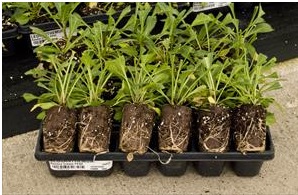info@bloomindesigns.com
Shop by Category
Shop by Brand
Shop by Brand
Leucanthemum

Shasta daisies (Leucanthemum) are beloved flowering perennials that bring a touch of sunshine to any garden. These resilient plants, with their classic white petals and golden centers, are incredibly easy to grow and offer months of beautiful blooms.
- Low-Maintenance Beauty: Shasta daisies thrive in full sun and well-drained soil. While they prefer moist conditions, they can tolerate short periods of drought once established.
- Versatile and Adaptable: These cheerful flowers are not fussy about soil type and can adapt to various garden settings. Use them for edging, mass plantings, borders, mixed beds, or even containers.
- Long-lasting Blooms: Enjoy a continuous display of flowers from late spring through summer. Regular deadheading encourages even more blossoms.
- Pollinator-Friendly: Shasta daisies attract butterflies and other beneficial pollinators to your garden.
- Deer-Resistant: Unlike many other flowering plants, Shasta daisies are typically left alone by deer.
